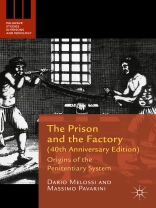This new edition of The Prison and the Factory, a classic work on radical criminology, includes two new, long essays from the authors and a foreword from Professor Jonathan Simon (UC Berkeley). In the two essays, Melossi and Pavarini reflect on the origins, development and fortune of The Prison and the Factory in relation to the debates surrounding mass incarceration that have taken place since this book was first published 40 years ago. The reputation of the original work has long been established worldwide, and this updated version will be of very special interest to scholars of the criminal justice system, penology, and Marxist theory.
This seminal book examines the links between the development of capitalist political economy and changing forms of social control. Melossi and Pavarini analyse the connection between the creation of penal institutions and regimes in Europe and the USA, and the problems generated by the emergence of capitalist
social relations. They provide a thorough neo-Marxist view of emergent capitalism and the penal mechanisms which are constructed to deal with the problem of labour.
Contemporary to but independent from the work of Michel Foucault, Melossi and Pavarini combine research on the development of penal philosophies and institutions with a rigorous account of changing forms of capital accumulation, focusing on the use, and the problem, of labour under capitalist relations.
Tabella dei contenuti
1. “The Prison and the Factory” Revisited (2017): Penality and the Critique of Political Economy Between Marx and Foucault.
Part 1 Prison and Labour in Europe and Italy During the Formation of the Capitalist Mode of Production
Dario Melossi
– 2. Creation of the Modern Prison in England and Europe (1550-1850).- 3. Genesis of the Prison in Italy.
Part 2 The Penitentiary Invention: The US Experience of the First Half of the Nineteenth Century
Massimo Pavarini
– 4. The Jacksonian Era: Economic Development, Marginality and Social Control Policy.- 5. The Penitentiary as a Model of the Ideal Society.- 6. Conclusions: Contractual Reason and Disciplinary Necessity at the Basis of Punishment by Deprivation of Liberty.- 7. Understanding Punishment Today (2017): The Prison Without the Factory.
Circa l’autore
Dario Melossi is Professor of Criminology in the School of Law of the University of Bologna.
Massimo Pavarini (1947-2015) was Professor of Criminal and Prison Law at the University of Bologna. He was one of the guiding lights of critical criminology throughout Latin America.












